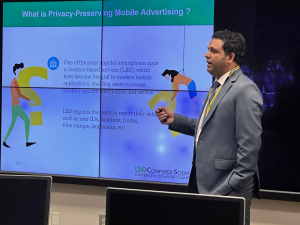In an era where smartphones have become an extension of ourselves, the balance between personalized services and privacy protection has never been more crucial. A groundbreaking study from the University of North Dakota offers a potential solution to this dilemma, specifically in the realm of mobile advertising.
Researchers Mr. Sanjaikanth E Vadakkethil Somanathan Pillai and Dr. Wen-Chen Hu have developed a novel approach that allows for targeted, location-based mobile advertisements while safeguarding user privacy. Their method, presented at the 2024 ACM Southeast Conference, combines advanced cryptographic techniques with innovative proximity testing to create a system where neither users nor merchants need to reveal their exact locations.
The Challenge of Location-Based Services
Location-based services (LBS) have revolutionized how we interact with our mobile devices, offering everything from nearby restaurant recommendations to real-time navigation. However, these services often require users to share sensitive location data, raising significant privacy concerns.
“Many users are reluctant to use these services because of privacy issues,” explains Mr. Pillai. “Our goal was to create a system that preserves the benefits of location-based advertising without compromising personal data.”

The Innovative Solution
The researchers’ approach utilizes a combination of homomorphic encryption, and a technique called private proximity testing. This allows the system to determine if a user and merchant are in the same general area without either party knowing the other’s exact location.
Key components of the system include:
- ElGamal Encryption: A public-key cryptosystem that allows for mathematical operations on encrypted data.
- Private Proximity Testing (PPT): A method to determine if two parties are geographically close without revealing exact locations.
- A Mediator: An intermediary component that facilitates secure communication between users and merchants.
How It Works
When a user wants to receive local advertisements, they send encrypted location and category preferences to the mediator. The mediator relays this information to relevant merchants, who then respond with their own encrypted data.
The system uses complex cryptographic operations to compare the user’s location and preferences with the merchants’ data, all while keeping the actual values hidden. Only if there’s a match in both location and category does the user receive the advertisement.
“The beauty of this system is that it allows for targeted advertising without anyone – not the user, not the merchant, and not even the mediator – knowing the exact locations involved,” says Mr. Pillai.
Prototype and Testing
To demonstrate their concept, the team developed a prototype Android application. The app allows users to browse different ad categories and view relevant local promotions without compromising their location data.
Screenshots from the prototype show a user-friendly interface where users can select from various advertisement types, such as food, entertainment, or shopping. When a category is selected, only ads from nearby businesses in that category are displayed, all without revealing the user’s precise location.
Limitations and Future Work
While the researchers say their method is effective, they acknowledge that further testing and formal security proofs are still needed. “Our next steps will focus on handling continuous location tracking for users on the move, rather than just static locations,” Pillai notes.
The team also plans to conduct more extensive real-world testing to ensure the system can handle the scale and complexity of actual mobile advertising ecosystems.
Implications for the Future of Mobile Privacy
As smartphones become increasingly central to our daily lives, balancing the benefits of location-based services with privacy protection remains a critical challenge. This research represents a promising step towards allowing useful, personalized mobile experiences without sacrificing user privacy.
“We’re at a crossroads where technology and privacy need to find a harmonious coexistence,” says Mr. Pillai. “Our work aims to show that it’s possible to have both personalized services and strong privacy protections.”
The implications of this research extend beyond just advertising. Similar principles could potentially be applied to other location-based services, from social networking apps to delivery services, all while maintaining user privacy.
For those interested in diving deeper into the technical aspects of the research, the team has made their prototype code available on GitHub. This open approach allows for further scrutiny and improvement of the system by the broader tech community.
As concerns about data privacy continue to grow, research like this offers hope that technological innovation can provide solutions that benefit both users and businesses. While there’s still work to be done before such a system could be widely implemented, it’s a significant step towards a future where our smartphones can be both smart and private.
Information contained on this page is provided by an independent third-party content provider. Binary News Network and this Site make no warranties or representations in connection therewith. If you are affiliated with this page and would like it removed please contact [email protected]



Comments